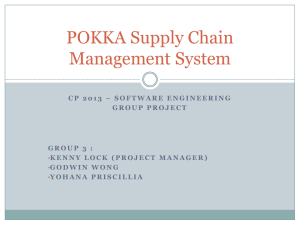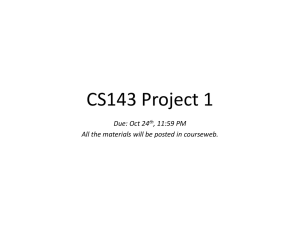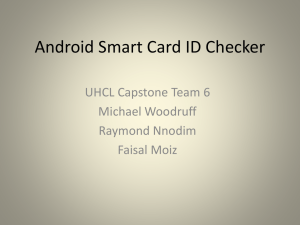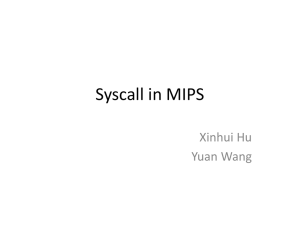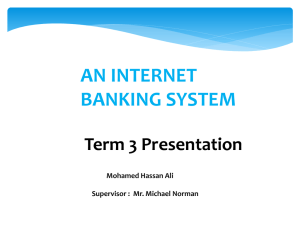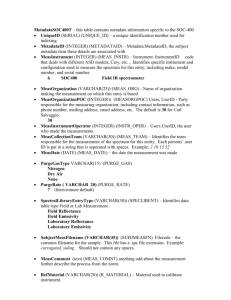String Functions
advertisement
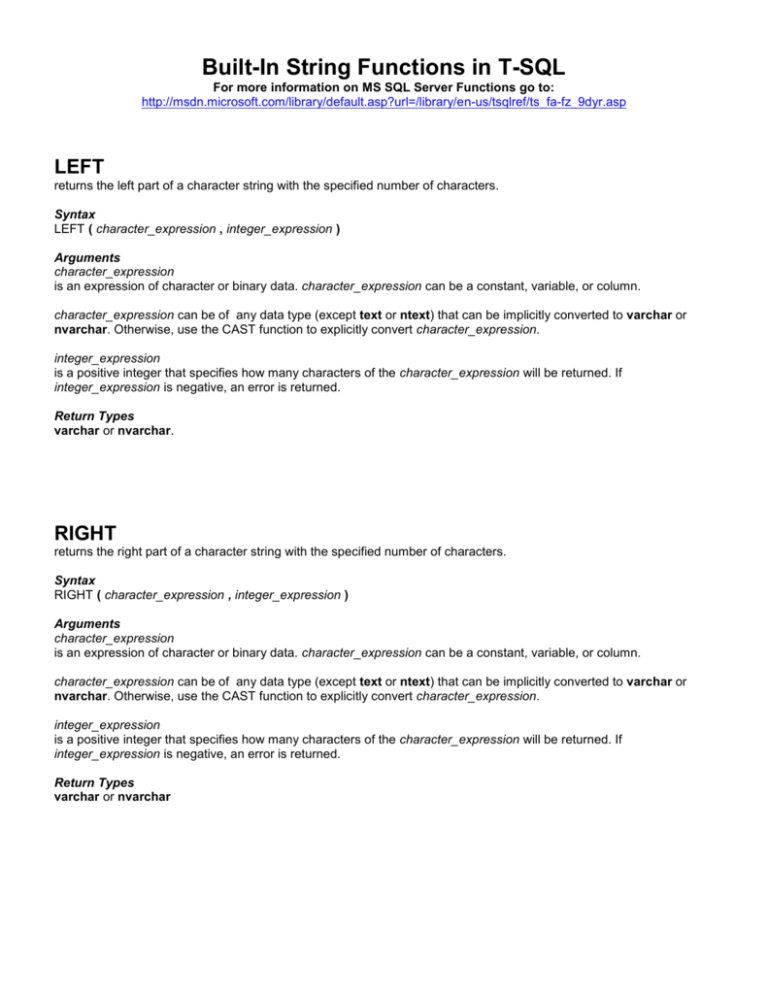
Built-In String Functions in T-SQL For more information on MS SQL Server Functions go to: http://msdn.microsoft.com/library/default.asp?url=/library/en-us/tsqlref/ts_fa-fz_9dyr.asp LEFT returns the left part of a character string with the specified number of characters. Syntax LEFT ( character_expression , integer_expression ) Arguments character_expression is an expression of character or binary data. character_expression can be a constant, variable, or column. character_expression can be of any data type (except text or ntext) that can be implicitly converted to varchar or nvarchar. Otherwise, use the CAST function to explicitly convert character_expression. integer_expression is a positive integer that specifies how many characters of the character_expression will be returned. If integer_expression is negative, an error is returned. Return Types varchar or nvarchar. RIGHT returns the right part of a character string with the specified number of characters. Syntax RIGHT ( character_expression , integer_expression ) Arguments character_expression is an expression of character or binary data. character_expression can be a constant, variable, or column. character_expression can be of any data type (except text or ntext) that can be implicitly converted to varchar or nvarchar. Otherwise, use the CAST function to explicitly convert character_expression. integer_expression is a positive integer that specifies how many characters of the character_expression will be returned. If integer_expression is negative, an error is returned. Return Types varchar or nvarchar LEN returns the number of characters, rather than the number of bytes, of the given string expression, excluding trailing blanks. Syntax LEN ( string_expression ) Arguments string_expression is the string expression to be evaluated. Return Types Int LTRIM returns a character expression after removing leading blanks. Syntax LTRIM ( character_expression ) Arguments character_expression is an expression of character or binary data. character_expression can be a constant, variable, or column. character_expression must be of a data type that is implicitly convertible to varchar. Otherwise, use CAST to explicitly convert character_expression. Return Type varchar RTRIM returns a character string after truncating all trailing blanks. Syntax RTRIM ( character_expression ) Arguments character_expression is an expression of character data. character_expression can be a constant, variable, or column of either character or binary data. Return Types varchar Remarks character_expression must be of a data type that is implicitly convertible to varchar. Otherwise, use the CAST function to explicitly convert character_expression. UPPER returns a character expression with lowercase character data converted to uppercase. Syntax UPPER ( character_expression ) Arguments character_expression is an expression of character data. character_expression can be a constant, variable, or column of either character or binary data. Return Types varchar Remarks character_expression must be of a data type that is implicitly convertible to varchar. Otherwise, use the CAST function to explicitly convert character_expression. LOWER returns a character expression after converting uppercase character data to lowercase. Syntax LOWER ( character_expression ) Arguments character_expression is an expression of character or binary data. character_expression can be a constant, variable, or column. character_expression must be of a data type that is implicitly convertible to varchar. Otherwise, use CAST to explicitly convert character_expression. Return Types varchar STR returns character data converted from numeric data. Syntax STR ( float_expression [ , length [ , decimal ] ] ) Arguments float_expression is an expression of approximate numeric (float) data type with a decimal point. length is the total length, including decimal point, sign, digits, and spaces. The default is 10. decimal is the number of places to the right of the decimal point. Return Types char Remarks If supplied, the values for length and decimal parameters to STR should be positive. The number is rounded to an integer by default or if the decimal parameter is 0. The specified length should be greater than or equal to the part of the number before the decimal point plus the number's sign (if any). A short float_expression is right-justified in the specified length, and a long float_expression is truncated to the specified number of decimal places. For example, STR(12,10) yields the result of 12, which is right-justified in the result set. However, STR(1223, 2) truncates the result set to **. String functions can be nested. To convert to Unicode data, use STR inside a CONVERT or CAST conversion function. SUBSTRING returns part of a character, binary, text, or image expression. Syntax SUBSTRING ( expression , start , length ) Arguments expression is a character string, binary string, text, image, a column, or an expression that includes a column. Do not use expressions that include aggregate functions. start is an integer that specifies where the substring begins. length is a positive integer that specifies how many characters or bytes of the expression will be returned. If length is negative, an error is returned. Return Types returns character data if expression is one of the supported character data types. Returns binary data if expression is one of the supported binary data types. The returned string is the same type as the given expression with the exceptions shown in the table. Given expression Return type text varchar image varbinary ntext nvarchar Remarks Offsets (start and length) using the ntext, char, or varchar data types must be specified in number of characters. Offsets using the text, image, binary, or varbinary data types must be specified in number of bytes. PATINDEX returns the starting position of the first occurrence of a pattern in a specified expression, or zeros if the pattern is not found, on all valid text and character data types. Syntax PATINDEX ( '%pattern%' , expression ) Arguments pattern is a literal string. Wildcard characters can be used; however, the % character must precede and follow pattern (except when searching for first or last characters). pattern is an expression of the short character data type category. expression is an expression, usually a column that is searched for the specified pattern. expression is of the character string data type category. Return Types Int CHARINDEX returns the starting position of the specified expression in a character string. Syntax CHARINDEX ( expression1 , expression2 [ , start_location ] ) Arguments expression1 is an expression containing the sequence of characters to be found. expression1 is an expression of the short character data type category. expression2 is an expression, usually a column searched for the specified sequence. expression2 is of the character string data type category. start_location is the character position to start searching for expression1 in expression2. If start_location is not given, is a negative number, or is zero, the search starts at the beginning of expression2. Return Types int Remarks If either expression1 or expression2 is of a Unicode data type (nvarchar or nchar) and the other is not, the other is converted to a Unicode data type. If either expression1 or expression2 is NULL, CHARINDEX returns NULL when the database compatibility level is 70 or later. If the database compatibility level is 65 or earlier, CHARINDEX returns NULL only when both expression1 and expression2 are NULL. If expression1 is not found within expression2, CHARINDEX returns 0. ASCII returns the ASCII code value of the leftmost character of a character expression. Syntax ASCII ( character_expression ) Arguments character_expression is an expression of the type char or varchar. Return Types Int CHAR is a string function that converts an int ASCII code to a character. Syntax CHAR ( integer_expression ) Arguments integer_expression is an integer from 0 through 255. NULL is returned if the integer expression is not in this range. Return Types char(1) Remarks CHAR can be used to insert control characters into character strings. The table shows some commonly used control characters. Control character Value Tab CHAR(9) Line feed CHAR(10) Carriage return CHAR(13)

